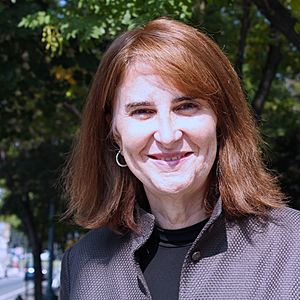Mara Keisling facts for kids
Quick facts for kids
Mara Keisling
|
|
|---|---|
 |
|
| Born | September 29, 1959 Scranton, Pennsylvania, U.S.
|
| Alma mater | Pennsylvania State University (BSS) |
| Occupation | Activist |
| Employer | National Center for Transgender Equality (2003– Summer 2021) |
| Known for | Transgender rights activism |
Mara Keisling (born September 29, 1959) is an American activist. She is known for her work supporting transgender rights. In 2003, she started the National Center for Transgender Equality (NCTE). This group works to protect the rights of transgender people in the United States.
Contents
Early Life and Education
Mara Keisling was born in Scranton, Pennsylvania. She was one of seven children. She earned a degree in Social Science from Pennsylvania State University. She also studied American Government at Harvard University. For 25 years, she worked in social marketing. She also taught government at two universities.
Activist Career
When Mara Keisling was in her early 40s, she shared that she was a transgender woman. She then moved back to Pennsylvania. There, she became an activist for transgender rights. She helped lead a group called the Pennsylvania Gender Rights Coalition. She realized there was a need for a strong voice for transgender people in Washington, D.C.
In 2002, she moved back to Washington. In 2003, she founded the National Center for Transgender Equality (NCTE). Besides her work at NCTE, Keisling also served on other boards. She was on the board of Common Roads, a youth group. She also helped lead the Statewide Pennsylvania Rights Coalition.
Many groups have honored Keisling for her activism. These include PFLAG, the Equality Forum, and the Transgender Law Center. In 2017, Ms. Magazine named her one of "45 Feminist Women to Follow on Twitter."
National Center for Transgender Equality (NCTE) Achievements
During Mara Keisling's time as executive director, NCTE achieved many important things. In 2007, Keisling and NCTE led a group called "United ENDA." This group included over 400 LGBTQ rights organizations. They worked to pass a law that would protect transgender people from job discrimination. This law was the first of its kind to be discussed in the U.S. Congress. It also led to the first Congressional meeting about transgender rights.
Under the Obama administration, NCTE worked to change rules for passports. They successfully pushed for new rules. These rules allowed transgender people to change the gender on their passport. They could do this without needing certain surgeries.
In 2008, NCTE worked with the National LGBTQ Task Force. They launched the National Transgender Discrimination Survey (NTDS). This was the largest study of transgender people in the U.S. at the time. It asked 6,450 transgender people about unfair treatment. This included issues in jobs, housing, and healthcare. The study's findings have helped shape public policy. For example, the United States Department of Housing and Urban Development used it. They created new housing rules to protect LGBTQ people.
In 2015, NCTE launched an even bigger survey. It was called the U.S. Transgender Survey (USTS). Nearly 28,000 transgender people took part. The survey covered many topics. These included family life, health, and discrimination. NCTE has released reports from this survey. These reports help people understand the lives of transgender Americans.
Mara Keisling was often asked to share her thoughts on political topics. She appeared on news channels like CNN and Fox News. She was also quoted in major newspapers. These included The New York Times and The Washington Post. She also wrote articles for many news outlets.
Protest in North Carolina
In 2016, the Governor of North Carolina signed a new law. This law removed protections for LGBTQ people. It also said that people in government buildings could only use restrooms that matched their birth certificate. Mara Keisling visited the North Carolina State Capitol to protest this law. She used the women's restroom in the governor's office. She shared a photo of the door on social media. She later joined other people in a sit-in protest. This protest took place at the North Carolina State Legislative Building.
Images for kids


